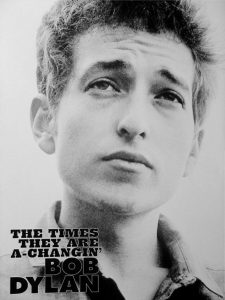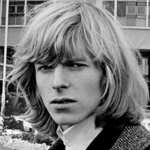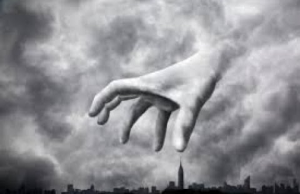
3. David Bowie, “Oh You Pretty Things” (1971):

In 1964’s “Times They Are A-Changin’,” Bob Dylan sang:
Come mothers and fathers throughout the land
and don’t criticize what you can’t understand
your sons and your daughters are beyond your command
your old road is rapidly agin’ ….
Seven years later, in “Changes,” Bowie would sing in similar vein:
And these children that you spit on
as they try to change their worlds
are immune to your consultations …
Turn and face the strange ….
Don’t tell them to grow up and out of it ….
At one level, Bowie’s “Oh You Pretty Things,” from the same year, shares the identical youth-revolt message:
Look out at your children
see their faces in golden rays
don’t kid yourself they belong to you
they’re the start of a coming race
 But this time the youth revolt is described in science-fiction metaphors of a new species supplanting the old (“Homo sapiens have outgrown their use …. gotta make way for the Homo superior”) and of an alien invasion (not the following year’s friendly sparkling Starman, sequestering himself to refrain from blowing our minds, but a terrifying “hand reaching down” from a “crack in the sky”). The song echoes Bulwer-Lytton’s The Coming Race (though his genetic supermen came from a crack in the ground rather than from one in the sky), H. G. Wells’s Food of the Gods (in which a rising generation of giants, intended as metaphors for the new social order, do battle with their parents’ generation, with the young giants’ leader described as “a great black outline against the starry sky, a great black outline that threatened with one mighty gesture the firmament of heaven”), Arthur C. Clarke’s Childhood’s End (where aliens in orbit cause the next generation of human children to become superhuman and lose all connection with previous humanity), and, once again, 2001: A Space Odyssey (with its hyper-evolved, no-longer-human Starchild arriving in the skies above Earth with an unknown purpose).
But this time the youth revolt is described in science-fiction metaphors of a new species supplanting the old (“Homo sapiens have outgrown their use …. gotta make way for the Homo superior”) and of an alien invasion (not the following year’s friendly sparkling Starman, sequestering himself to refrain from blowing our minds, but a terrifying “hand reaching down” from a “crack in the sky”). The song echoes Bulwer-Lytton’s The Coming Race (though his genetic supermen came from a crack in the ground rather than from one in the sky), H. G. Wells’s Food of the Gods (in which a rising generation of giants, intended as metaphors for the new social order, do battle with their parents’ generation, with the young giants’ leader described as “a great black outline against the starry sky, a great black outline that threatened with one mighty gesture the firmament of heaven”), Arthur C. Clarke’s Childhood’s End (where aliens in orbit cause the next generation of human children to become superhuman and lose all connection with previous humanity), and, once again, 2001: A Space Odyssey (with its hyper-evolved, no-longer-human Starchild arriving in the skies above Earth with an unknown purpose).

The song shifts among multiple perspectives on its topic. a) In the lines quoted above, Bowie is addressing the parents on behalf of the children. But b) he also addresses the children on behalf of the parents: “Oh you pretty things / don’t you know you’re driving your mamas and papas insane.” (The line is also a joke on “Pretty Things” and “The Mamas and the Papas” as names of popular contemporary bands.) And the song also takes on, in its opening lines, c) the perspective of the parents themselves, for whom the rising generation are nightmarish alien invaders disrupting the previous generation’s comfortable breakfast routine. Strikingly, we never get to hear unambiguously from d) the children themselves.
The “strangers” might be a nod to Camus; the “puzzled man” is usually thought to be Nietzsche (which fits with the “Homo superior” theme – though “puzzled” never particularly struck me as Nietzsche’s go-to style); and the lines about the “world to come / where the books were found by the Golden Ones” have been seen as a reference to Ayn Rand’s Anthem, where two humans in the far future, one nicknamed the “Golden One,” escape from the stifling conformity of their society and come across ancient books from our own time period wherein they rediscover the concept of individuality – though I don’t know of any evidence that Bowie read Anthem. (Still, he was a voracious reader, so who knows?)
A different version:
4. Deadmau5, “The Veldt” (2012)
Continuing the theme of unsettling youth revolt, Deadmau5’s “The Veldt” is based on Ray Bradbury’s famous story of the same name, in which two children grow so engrossed in the computer-simulated African savannah in their bedroom that when their parents try to make them leave, the children program the room’s lions to kill them.
No comments yet.